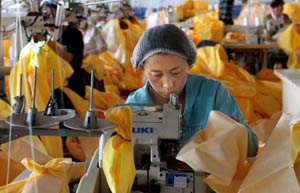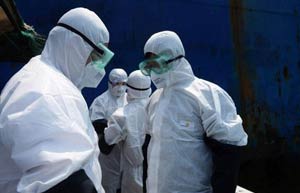GUANGZHOU - As China sends more aid to the Ebola-plagued west Africa, medical equipment suppliers are fighting the epidemic on another front as they rush to meet the soaring global demand for protective products.
Protective gear such as coveralls, gloves and goggles are essential supplies in the battle against the deadly virus, with Chinese suppliers seeing a wave of orders from concerned countries.
Gao Yan, a sales manager of Crown Name Disposable Hygiene Products Fty Ltd based in Hubei province, said since the outbreak of the epidemic, the firm has received a flux of inquiries on orders.
"People are calling from everywhere, asking whether we have anything in stock," Gao told Xinhua at the Canton Fair, the country's largest trade event.
 |
 |
Cai Tianzhi, vice secretary-general of the China Chamber of Medicine and Health Products, said the Chinese producers, which have over 50 percent of the world market share for medical protective gear, have responded quickly to the demand.
At the fair, Gao's company was showcasing a new line of products specially designed for Ebola prevention, catching the eye of foreign buyers.
"It is made with a brand new, leakproof material, with double zippers to enhance prevention. And the whole garment is not sewed but heat sealed, so you'll find no slots at all," said Gao.
As the protective wear is mostly a one-off sale and needs to evolve frequently, many of Gao's clients have placed large quantity orders, asking for prompt delivery.
"We're scrambling to meet orders. Also almost all customers require air freight, which means logistic costs are even higher than the product price," Gao said.
"We usually pay less than $1 for the shipping of one box, but if it goes by air, it'll cost $70 to $80," Gao said. "So you can imagine how urgent it is!"
Gao said the company is considering hiring more staff and installing new machines. "We now have barely anything in stock. Our products are transported to the airport as soon as they get off the assembly lines," she said.
"At the same time, we're sending samples to a laboratory in the United Kingdom for more tests in a bid to get green light to the European market," Gao added.
China exported $361 million worth of non-woven medical wear in the first half of 2014, up 9 percent year on year.
"Considering the spread of the Ebola epidemic in the second half of the year, there'll be definitely a sharp increase," Cai said.
Starting in April, China, the first foreign country to provide assistance to the affected nations, has delivered three batches of emergency relief items to west Africa with the fourth batch under way. The aid is worth $122 million in total.
"Our products are among the aid supplies,"said Zheng Xiaoming, president of another hygiene product producer in Hubei province. "Our turnover has increased more than 50 percent since the Ebola outbreak."
Zheng's factory can produce 200,000 pieces of protective coveralls in one month. He said the company will never sacrifice quality for quantity. "It's literally a matter of life and death," he said.
